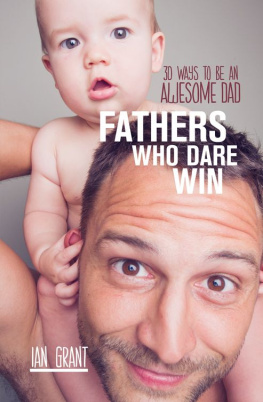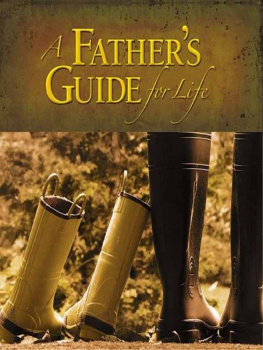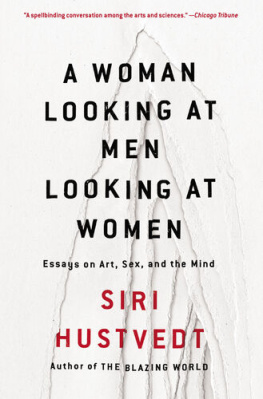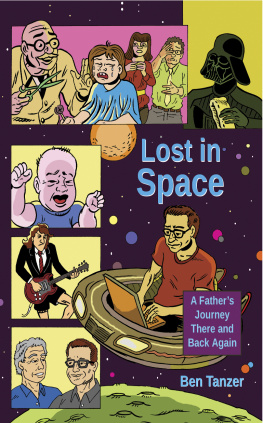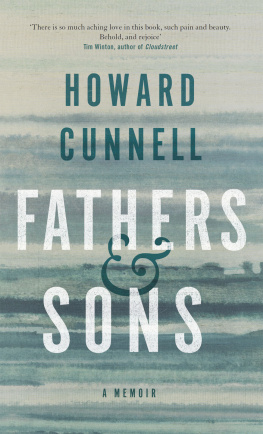MAN IN THE MOON
ESSAYS ON FATHERS & FATHERHOOD
Edited by Stephanie GSchwind
THE CENTER FOR LITERARY PUBLISHING
COLORADO STATE UNIVERSITY
Copyright 2014 by The Center for Literary Publishing
All rights reserved
Printed in the United States of America
First edition
Because this page cannot accommodate all copyright notices,
constitute an extension of the copyright page.
The Center for Literary Publishing
9105 Campus Delivery
Department of English
Colorado State University
Fort Collins, Colorado 80523-9105
coloradoreview.colostate.edu
Typeset in Apollo MT by the Center for Literary Publishing
Manufacturing by Courier Westford
Printed in the United States
Cover design by Drew Nolte
Library of Congress Cataloging-in-Publication Data
Man in the moon : essays on fathers and fatherhood / Stephanie GSchwind.
pages cm
ISBN 978-1-885635-35-8 (paperback) -- ISBN 978-1-885635-36-5 (electronic)
1. Fathers--Literary collections. 2. Fatherhood--Literary collections.
3. Fathers and sons--Literary collections. 4. Fathers and daughters--Literary collections. I. GSchwind, Stephanie, editor of compilation. II. Title:
Essays on fathers and fatherhood.
PS509.F34M36 2014
810.8035251--dc23 2014010860
1 2 3 4 5 18 17 16 15 14
For my father and yours
INTRODUCTION
Stephanie GSchwind
IN THE EARLY STAGES of putting this anthology together, I was catching up with a colleague I hadnt seen in a while, telling him about the book, the essays I already had in mind, what a great collection it would be. He was nodding with interest, and then asked me, So where did this come from?
Well, I said, Ive published a number of essays in Colorado Review about fathers, and I thought it would be interesting to gather them together with some others, you know, in a collection.
Bruce was quiet for a moment, and then he tried again. No, I mean where did the interest in fathers come from?
Oh that.
It is something you live with for so long that you really do, eventually, become so used to itthe grief, such a familiar companionyou hardly notice it anymore. Until someone points it out. Yes, there it is, still, no longer raw, not nearly as tender, but there nonetheless. Your loss. Your lost father. My lost father.
No real surprise, that tender spot stirs a curiosity in me for stories of other peoples relationships with their fathers. Do theydid theyreally know each other? What did they talk about? Were they close? It seems for many of us that a father can be at times so unknowable, the distance between him and his children so great, he might as well be the man in the moon.
My father and I were almost there, having just crested the long uphill climb of my adolescence and about to be two adults who might have, over so many more years, come to know each other not as adult and child, but as father and daughter. And surely wed have figured out how to say all those things we hadnt yet been able say to each otheranything, everything, nothing in particularclosing an awkward gap.
He died when I was twenty-two, that distance between us forever fixed.
Since then, Ive spent a great deal of time trying to understand why it was so difficult for us to be closer. Ive come to believe it likely had a lot to do with his struggles with his own father. Assigned in various parts of the world with the Army Corps of Engineers during World War Two, Grandpa was gone for the first three years of my fathers life, and they did not have an easy time becoming acquainted with each other upon his return, never settling into a comfortable affection, never able to find a common language. They had a rather miserable go of it through my fathers childhood and adolescencesparring and feuding when they werent entrenched in prolonged silencesbefore moving into a tacit dtente for the rest of their lives, the space between them vast and unoccupied.
That spacein its nearly infinite dimensions, textures, and configurationsis what intrigues me. If we are to make sense of this terrain, this relationship, we must venture out into it, because that is where we will find our fathers, where they will find us. Bill Capossere studies the night sky, attempting to preserve his waning memories of his father through their shared passion for astronomy. Though her father lives just one floor below her, Gina Frangello watches him moving away from her on a journey across the white barren land of dementia. Brendan Wolfe, Robin Black, Richard McCann, and Jerald Walker search for theirs in stories, in fiction, in writing. Neil Mathison looks to helixes of DNA and recollections of family road trips. Joan Marcus imagines her merchant marine father on deck, alone in that pocket of fog... All around him, silent markers of ruin. And Dinty W. Moore scans the television airwaves for a surrogate father.
And when we find them, what will we say? For some of us, to even talk with our fathers, to have a simple exchange, is fraught. A conversation with him, Brendan Wolfe writes, is like playing tennis with someone who, instead of volleying the ball back to you, catches it, turns it around in his hand, and then stuffs it in his pocket. The silence between Thomas White and his father continued until a deep rut of miscommunication formed from which neither of us could willfully emerge, and the rut, so toxic, became the relationship. Debra Gwartney holds vigil by her fathers bed in the intensive care unit, awaiting the three words that hes never spoken to her.
How, then, can we ever connect with our fathers, understand them, be understood by them? Carole Firstman sifts through her elderly fathers arachnology research and specimens, considering what the scorpion revealswhat it might tell me about my fathers life work, about my father himself. About the connection between my father and myself. Reflecting on not following her fathers path to a career in chemistry, Deborah Thompson asks, Did my father feel betrayed when I rejected his world? Matthew Ferrence, though, rejecting his fathers love of hunting, suggests that perhaps closeness resides when differences mount. Richard McCann recalls his attempt to complete his fathers unfinished novel and wonders, Was I hoping that by entering his words, I might somehow come to know him? Donna George Storey watches a man and his daughter shopping at a bookstorethe rhythm of his voice, the way he bends close to the girl recalling the ritual she and her own father shared.
But then, perhaps, the most luminous point of connection: the child becomes the parent, the son becomes the father. Parenthood, for me, Dan Beachy-Quick writes, is inextricably caught in the paradox of being a father and a child at oncea child with a child, a father with a father. Thomas White channels his fathers forgiveness as he lifts his own son from the muck of a muddy hike. Jim Kennedy remembers a split second of magnificent, three-generational grace as his young son was falling down the stairs: Just as I grabbed Thomas upside down in my arms... my father and I looked into each others eyes and experienced the moment as one.
Many of these essays are painful. Fathers are dying or have died, and in one, a boy slips forever from his fathers hands; some fathers are angry and neglectful, though some gentle and loving; and some are just not there at all. But you will find, too, beauty and sometimes humor and, of course, compassion, forgiveness, and lovethe real occasions for many of these pieces. And perhaps in them, or just beyond them, you will find your own father, find yourself.


